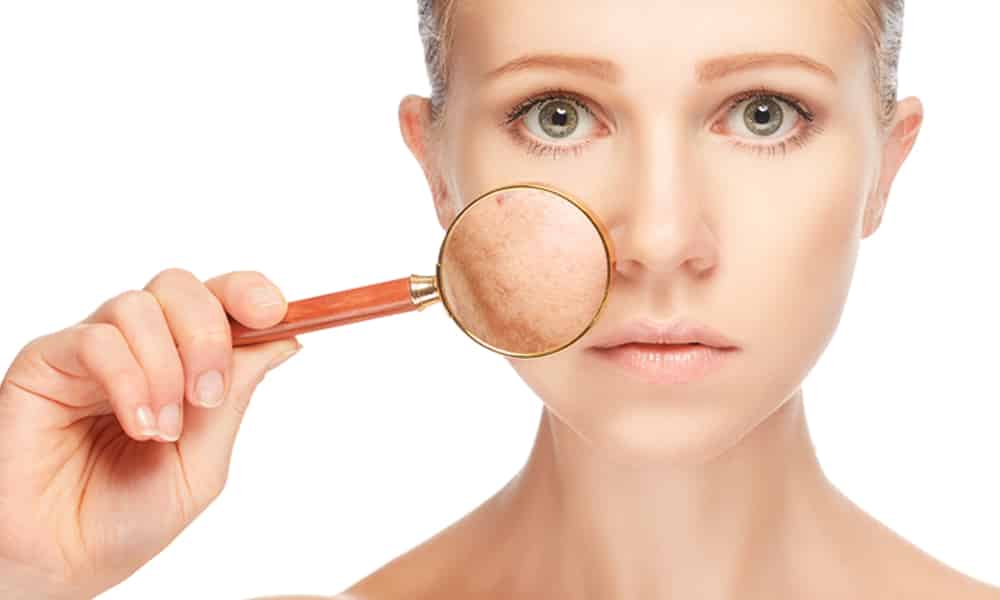Pigmentation refers to the coloring of the skin. When pigment-producing cells (melanocytes) overproduce melanin, it can result in darker patches or spots on the skin. This condition can affect individuals of all skin types and tones, leading to uneven skin tone and a less radiant complexion.
Causes of Pigmentation
Sun Exposure
Sun exposure is the leading cause of pigmentation. Ultraviolet (UV) rays from the sun stimulate melanocytes to produce more melanin, leading to sunspots or age spots, particularly on areas frequently exposed to the sun, such as the face, hands, and arms. Consistent and prolonged sun exposure without adequate protection accelerates this process.
Hormonal Changes
Hormonal fluctuations, particularly in women, can cause pigmentation issues. Conditions like melasma often occur during pregnancy or with the use of birth control pills. The increase in hormone levels can trigger melanocytes to overproduce melanin, resulting in dark patches, usually on the face.
Post-Inflammatory Hyperpigmentation (PIH)
PIH is a response to skin injury or inflammation, such as acne, eczema, or psoriasis. When the skin heals, it can leave behind dark spots as a result of the inflammatory process stimulating melanin production. This type of pigmentation is common in individuals with darker skin tones.
Genetics
Genetic predisposition can play a significant role in pigmentation. Individuals with a family history of pigmentation disorders are more likely to experience similar issues. Genetic factors can influence how melanocytes respond to environmental triggers like sun exposure or hormonal changes.
Effective Pigmentation Laser Treatments in Singapore
Q-Switched Nd Laser
The Q-Switched Nd Laser is one of the most popular laser treatments for pigmentation. It targets melanin in the skin, breaking it down into smaller particles that the body can naturally eliminate. This laser treatment is highly effective for sunspots, age spots, and PIH. It offers minimal downtime, making it a convenient option for those with busy schedules.
Pico Laser
Pico Laser is a cutting-edge technology that delivers ultra-short pulses of laser energy to the skin. These pulses break down pigment particles more effectively and with less heat, reducing the risk of damage to surrounding tissues. Pico Laser is particularly effective for stubborn pigmentation like melasma and offers faster results with fewer sessions compared to traditional lasers.
Intense Pulsed Light (IPL) Therapy
IPL therapy uses broad-spectrum light to target pigmentation. It is effective for treating sunspots, age spots, and other superficial pigmentation issues. IPL therapy also improves skin texture and reduces redness, providing an overall rejuvenating effect. Multiple sessions are usually required for optimal results.
Fractional CO2 Laser
Fractional CO2 Laser treatment involves creating micro-injuries in the skin to stimulate collagen production and accelerate skin healing. This process helps in breaking down pigmentation and improving skin tone. While it offers significant improvement, it comes with a longer downtime compared to other laser treatments for pigmentation.
Preventing Pigmentation
Sun Protection
Consistent use of broad-spectrum sunscreen with at least SPF 30 is crucial in preventing pigmentation. Sunscreen should be applied daily, even on cloudy days, and reapplied every two hours when exposed to the sun. Wearing protective clothing, hats, and sunglasses also helps in minimizing UV exposure.
Skincare Routine
Incorporating products with ingredients like vitamin C, niacinamide, and retinoids can help in preventing and reducing pigmentation. These ingredients work by inhibiting melanin production and promoting skin cell turnover. Regular exfoliation can also aid in removing dead skin cells and preventing pigmentation buildup.
Avoiding Triggers
Identifying and avoiding triggers that can exacerbate pigmentation is essential. For those prone to PIH, managing underlying skin conditions like acne or eczema can prevent flare-ups that lead to pigmentation. Hormonal treatments should be monitored and adjusted under the guidance of a healthcare professional.
Conclusion
Pigmentation issues can be effectively managed and treated with the right approach. In Singapore, a range of advanced laser treatments, including Q-Switched Nd
Laser and Pico Laser, offer promising results for clear and even skin tone. By understanding the causes of pigmentation and taking preventive measures, individuals can maintain a radiant complexion and minimize the recurrence of pigmentation.











